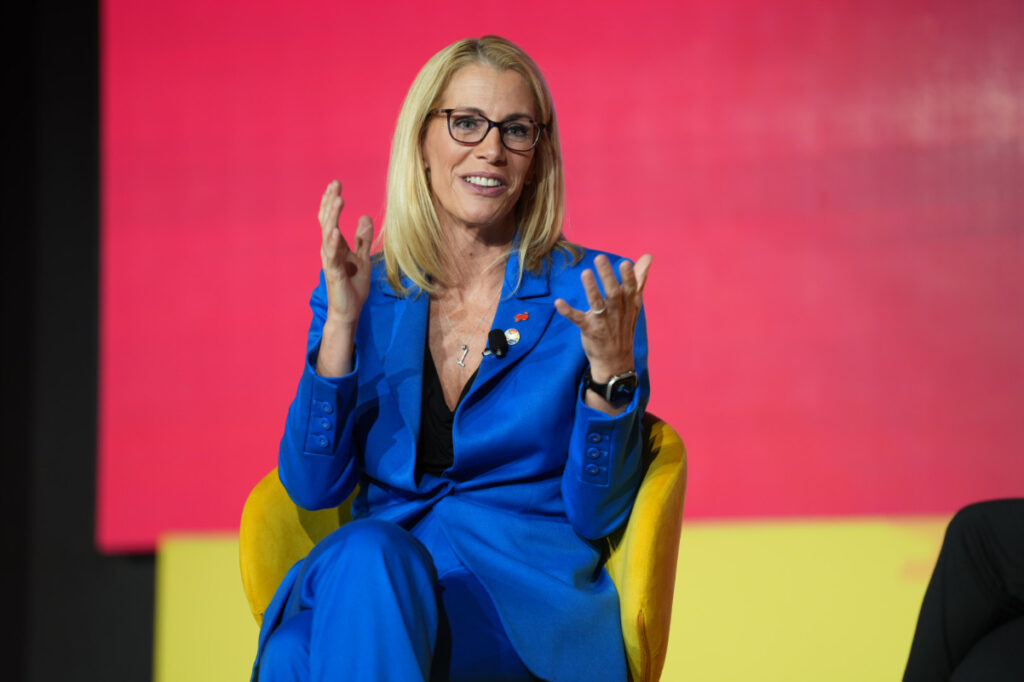
Skift Take
Delta’s non-unionized flight attendants could make another push to organize “in a few months,” said Sara Nelson, head of a 55,000-member union. Nelson cited broader public support for labor as one driver of change.
Flight attendants at Delta Air Lines may soon make another push to unionize as broader public support for organized labor creates momentum, according to the head of the largest US flight attendants union.
Sara Nelson, international president of the Association of Flight Attendants-CWA, AFL-CIO, said Tuesday that developments in the long-running campaign to organize Delta’s cabin crew could emerge “in a few months.”
“The big change today is that we have a positive view of unions in the public,” Nelson said onstage at the Skift Aviation Forum in Dallas-Fort Worth. “They’re one of the most popular things in the country.”
Nelson, who represents 55,000 members at 20 airlines, cited stronger support from community organizations and elected officials in Atlanta, Delta’s headquarters city, and Gen Z’s pro-union attitudes as factors that could tip the balance after three failed attempts over a couple of decades to unionize the carrier’s flight attendants.
Flight Attendant Priorities
Nelson said Delta’s recent move to pay flight attendants for boarding time — unique among major US carriers — was a direct response to union pressure.
But she acknowledged that it was also driven by the airline’s effort to attract and retain Gen Z talent. Many younger workers have different expectations about compensation and working conditions.
The initiative has since been expanded elsewhere, with “better terms” secured in contracts at American Airlines Group and a pending agreement at Alaska Air Group, Nelson said.
Nelson highlighted a handful of other union’s priorities, including:
- A two-tiered wage system that pays workers at regional airlines about 45% less than those at mainline carriers
- Concerns about health and working conditions, including radiation exposure. “We have a much higher rate of cancer among flight attendants,” she said.
- Harmonizing regulations across countries, especially on safety.
What Flight Attendants Have Won
Addressing concerns that unions drive up costs and hurt passenger experience, Nelson argued that union advocacy has historically improved safety and service, citing the elimination of in-flight smoking and pesticide spraying as examples.
“Regulations can, if they’re done well, improve the safety standards so that everyone is on board with them,” Nelson said. “It’s pro-competition because it raises the level of the requirements for everyone.”
The union chief pointed to the pandemic response as evidence of organized labor’s value, crediting prior union-backed safety training for helping protect flight attendants during the pandemic.
Nelson also highlighted the union’s role in securing federal payroll support that kept aviation workers employed through the crisis. The program kept aviation workers connected to their paychecks, healthcare, and other benefits for 16 months and banned stock buybacks for a period of time.
Nelson — who was recently named chair of the Civil Aviation section of the International Transport Workers Federation, which represents 5 million aviation workers worldwide — said labor campaigns often help companies and customers as much as employees.
“Passengers would not have the safety in the cabin they have if it were not for our union,” Nelson said. “There’s not just a vending machine and ‘Fend for yourselves.’”
Airlines Sector Stock Index Performance Year-to-Date
What am I looking at? The performance of airline sector stocks within the ST200. The index includes companies publicly traded across global markets including network carriers, low-cost carriers, and other related companies.
The Skift Travel 200 (ST200) combines the financial performance of nearly 200 travel companies worth more than a trillion dollars into a single number. See more airlines sector financial performance.
Read the full methodology behind the Skift Travel 200.

